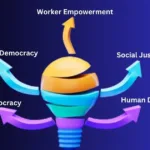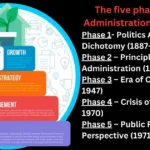The Core Ideas of Democratic Socialism is a important aspect in the study of Democratic Socialism. Democratic Socialism is a political ideology that combines the principles of democracy and socialism to create a more egalitarian society. “Explore the fundamental principles of Democratic Socialism in this insightful meta description. Discover how this ideology merges the ideals of democracy with a commitment to social equality and economic justice. Delve into key concepts such as collective ownership, social welfare programs, and democratic decision-making processes.
Uncover the core values driving Democratic Socialism, including fairness, solidarity, and the pursuit of a more equitable society. Engage with nuanced discussions on the role of government, markets, and community empowerment within this progressive framework. Gain a deeper understanding of how Democratic Socialism seeks to address systemic inequalities while promoting individual freedoms and societal well-being. Dive into this thought-provoking exploration of one of the most compelling socio-political movements of our time.”
By examining the historical roots and modern-day implications of democratic socialism, we can better understand its potential for reshaping our world.
Defining Democratic Socialism
Democratic socialism advocates for a balance between the free market and government intervention to ensure economic and social equality.
It emphasizes the importance of collective ownership, social welfare programs, and progressive taxation to address societal disparities.
Historical Roots of Democratic Socialism
The origins of democratic socialism can be traced back to figures like Eugene V. Debs and Rosa Luxemburg, who fought for workers’ rights and social justice in the late 19th and early 20th centuries.
The ideology gained momentum during the Great Depression and has since evolved to address contemporary challenges.
The Rise of Democratic Socialism in Modern Politics
In recent years, democratic socialism has gained popularity in countries like the United States, where politicians like Bernie Sanders and Alexandria Ocasio-Cortez have championed its principles.
By advocating for policies like universal healthcare and free education, they have brought democratic socialism to the forefront of political discourse.
Core Ideas of Democratic Socialism

Democratic socialism is built on three core principles that shape its policy proposals and political agenda.
This principle emphasizes the importance of cooperatives, worker-owned businesses, and fair wages to promote economic equity.
By advocating for policies that benefit marginalized communities and protect human rights, democratic socialists strive to create a more just and inclusive society for all.
Worker Empowerment
Worker empowerment is a key pillar of democratic socialism, as it seeks to give workers a voice in decision-making processes and protect their rights in the workplace.
By supporting labor unions and collective bargaining, democratic socialists aim to empower workers and ensure fair treatment.
Economic Democracy:
Democratic socialism emphasizes the importance of economic democracy, which means that the means of production, distribution, and exchange should be owned or regulated by the community as a whole rather than by private individuals or corporations.
This includes worker-owned cooperatives, public ownership of essential industries, and democratic control over major economic decisions.
Social Justice:
A central tenet of democratic socialism is the pursuit of social justice. This involves addressing inequalities in wealth, income, and opportunity through redistributive policies such as progressive taxation, social welfare programs, and affirmative action measures.
The goal is to create a more equitable society where everyone has access to the resources and opportunities they need to thrive.
Political Democracy:
Democratic socialists advocate for robust political democracy, where political power is decentralized and citizens have a meaningful say in decision-making processes.
This includes advocating for proportional representation, direct democracy mechanisms such as citizen initiatives and referendums, and reducing the influence of money in politics through campaign finance reform.
Social Ownership and Control:
In addition to economic democracy, democratic socialism supports social ownership and control of key sectors such as healthcare, education, housing, and utilities.
This ensures that essential services are provided based on need rather than profit motive, and that decisions about these services are made democratically and transparently.
Solidarity and Collective Action:
Democratic socialism promotes the idea of solidarity and collective action among workers and marginalized groups.
This involves building alliances across different social movements and advocating for policies that benefit the common good rather than narrow interests.
Solidarity is seen as essential for challenging entrenched power structures and achieving meaningful social change.
Environmental Sustainability:
Recognizing the urgent need to address climate change and environmental degradation, democratic socialism emphasizes the importance of sustainable development and environmental stewardship.
This includes transitioning to renewable energy sources, promoting conservation and ecological restoration efforts, and implementing policies to reduce carbon emissions and mitigate the impacts of climate change on vulnerable communities.
International Solidarity and Peace:
Democratic socialists believe in international solidarity and cooperation as a means of promoting peace, justice, and equality on a global scale.
This involves supporting efforts to address global poverty, inequality, and human rights abuses, as well as advocating for diplomacy and peaceful conflict resolution rather than military intervention or aggression.
Free and Universal Public Services:
Democratic socialism calls for the provision of free and universal public services such as healthcare, education, childcare, and public transportation.
These services are seen as essential for ensuring that everyone has access to the basic necessities of life and can fully participate in society regardless of their income or background.
Decentralization and Participatory Democracy:
Democratic socialists advocate for decentralization of power and decision-making authority, both within the government and within organizations and communities.
This includes promoting participatory democracy at the local level, where citizens have a direct say in the decisions that affect their lives, as well as devolving power away from centralized institutions to empower grassroots movements and initiatives.
Human Dignity and Rights:
At the heart of democratic socialism is a commitment to upholding human dignity and rights for all people.
This means ensuring that everyone has access to food, shelter, healthcare, education, and other basic necessities, as well as protecting civil liberties and promoting equality and non-discrimination in all areas of life.
Democratic socialists believe that every person deserves to be treated with respect and dignity, regardless of their race, gender, sexual orientation, or socioeconomic status.
Key Policies of Democratic Socialism

The implementation of democratic socialist policies is crucial to achieving economic and social equality in society.
Universal Healthcare
One of the flagship policies of democratic socialism is the establishment of a universal healthcare system that guarantees access to quality medical care for all citizens.
By removing financial barriers to healthcare, this policy seeks to promote public health and well-being.
Free Education
Democratic socialists advocate for tuition-free education at all levels to ensure that every individual has access to quality learning opportunities.
By investing in education, society can empower individuals to reach their full potential and contribute to the common good.
Wealth Redistribution
To address income inequality and promote economic fairness, democratic socialists support policies that redistribute wealth through progressive taxation and social welfare programs.
By ensuring a more equitable distribution of resources, society can reduce poverty and improve overall living standards.
Challenges and Criticisms of Democratic Socialism
Despite its potential benefits, democratic socialism faces several challenges and criticisms that warrant consideration.
Impact on Business and Innovation
Critics argue that democratic socialist policies could stifle business growth and innovation by imposing excessive regulations and limiting entrepreneurial freedom.
Balancing economic equality with market dynamics poses a complex challenge for democratic socialist systems.
Concerns about Government Control
Skeptics raise concerns about the role of government in democratic socialist societies, fearing that excessive intervention could lead to inefficiency and bureaucratic inefficacy.
Finding a balance between state oversight and individual liberty is essential for the success of democratic socialist policies.
Financial Feasibility
Questions about the financial feasibility of democratic socialist initiatives persist, with critics questioning how such policies will be funded without burdening taxpayers or sacrificing economic growth.
Ensuring sustainable funding mechanisms is a critical consideration for the implementation of democratic socialist programs.
Implementing Democratic Socialism in the 21st Century

Exploring international examples of democratic socialist policies and grassroots movements offers insights into the practicality of implementing democratic socialism today.
Implementing Democratic Socialism in the 21st century requires a comprehensive strategy that addresses the unique challenges and opportunities of our modern era. Here’s a detailed description with key points:
Adapting to Technological Advancements:
Utilize digital platforms and emerging technologies to enhance democratic processes and citizen engagement.
Implement transparent and accessible online voting systems to increase participation and accountability.
Leverage data analytics for evidence-based policymaking and resource allocation in areas such as healthcare, education, and social welfare.
Promoting Economic Justice and Equality:
Advocate for progressive taxation policies to ensure the wealthy contribute their fair share to social programs and public services.
Implement a living wage and strengthen labor rights to address income inequality and improve the standard of living for all workers.
Support worker-owned cooperatives and community-controlled enterprises to democratize the economy and empower local communities.
Ensuring Universal Access to Essential Services:
Establish universal healthcare coverage to guarantee access to quality medical services and reduce disparities in health outcomes.
Invest in public education from early childhood through higher education to provide equal opportunities for all individuals to fulfill their potential.
Implement affordable housing initiatives and robust social safety nets to address homelessness and poverty.
Protecting Civil Liberties and Human Rights:
Safeguard freedom of speech, assembly, and expression to ensure a vibrant and pluralistic democratic society.
Uphold the rights of marginalized communities, including LGBTQ+ individuals, immigrants, people of color, and religious minorities.
Reform criminal justice systems to prioritize rehabilitation and reintegration over punitive measures, addressing systemic injustices and promoting community well-being.
Addressing Climate Change and Environmental Sustainability:
Implement green infrastructure projects and renewable energy initiatives to mitigate the effects of climate change and transition to a sustainable economy.
Advocate for environmental justice policies that prioritize the needs of frontline communities disproportionately affected by pollution and environmental degradation.
Support international agreements and cooperation to combat climate change on a global scale and ensure a just transition for workers in fossil fuel industries.
Fostering International Cooperation and Solidarity:
Engage in diplomatic efforts to promote peace, disarmament, and conflict resolution in regions affected by violence and instability.
Provide humanitarian aid and support for refugees and displaced persons, upholding principles of compassion and solidarity.
Advocate for fair trade policies and debt relief for developing countries to reduce global economic disparities and promote sustainable development.
Building Democratic Institutions and Accountability Mechanisms:
Strengthen checks and balances, independent judiciary, and free press to safeguard democracy and prevent authoritarianism.
Enhance transparency and accountability in government by implementing anti-corruption measures and whistleblower protections.
Encourage civic participation and community organizing to amplify diverse voices and hold elected officials accountable to their constituents.
Implementing Democratic Socialism in the 21st century requires a holistic approach that addresses economic, social, and environmental challenges while upholding democratic values and human rights.
By embracing innovation, collaboration, and a commitment to justice, professionals can work towards building a more equitable and sustainable world for future generations.
International Examples of Democratic Socialist Policies
Countries like Sweden, Denmark, and Finland have successfully implemented democratic socialist policies like universal healthcare and free education.
By studying these models, policymakers can learn from best practices and adapt them to their own contexts.
Grassroots Movements for Social Change
Activist movements advocating for social justice and economic equality play a vital role in advancing democratic socialist ideals.
By mobilizing communities and raising awareness, grassroots organizations can push for policy reforms that benefit the most vulnerable members of society.
Socialism vs. Social Democracy: Understanding the Differences
Distinguishing between socialism and social democracy is essential for clarifying the goals and strategies of democratic socialist movements.
While socialism advocates for the collective ownership of resources, social democracy combines capitalist and socialist principles to achieve social welfare.
Conclusion
The potential of democratic socialism to revolutionize society lies in its commitment to economic democracy, social justice, and worker empowerment.
By fostering collaboration and innovation, we can address inequality and move towards a more just and sustainable future for all.
FAQs
1. What is Democratic Socialism?
Democratic Socialism is a political ideology that advocates for a democratic political system alongside a socialist economic system. It aims to achieve social equality, economic justice, and individual freedoms through democratic means.
2. How does Democratic Socialism differ from traditional socialism?
While both ideologies emphasize social ownership of the means of production, Democratic Socialism places a stronger emphasis on democratic decision-making processes, individual liberties, and a mixed economy that combines elements of both public and private ownership.
3. What are the core principles of Democratic Socialism?
The core principles of Democratic Socialism include social equality, economic justice, democratic governance, collective ownership of key industries, provision of social welfare programs, and a commitment to human rights and civil liberties.
4. How does Democratic Socialism address income inequality?
Democratic Socialism seeks to address income inequality through progressive taxation, redistribution of wealth, establishment of a living wage, and ensuring access to essential services such as healthcare, education, and housing for all citizens.
5. Does Democratic Socialism advocate for the abolition of capitalism?
While Democratic Socialism criticizes many aspects of capitalism, it does not necessarily seek its complete abolition. Instead, it aims to regulate capitalism to mitigate its negative effects and promote social justice through a combination of public ownership, regulation, and social welfare programs.
6. What role does government play in a Democratic Socialist society?
In a Democratic Socialist society, the government plays a significant role in ensuring social welfare, regulating the economy to prevent exploitation, and providing essential services such as healthcare, education, and housing. However, the government operates within a framework of democratic principles and accountability to the people.
7. How does Democratic Socialism promote individual freedoms?
Democratic Socialism advocates for individual freedoms by ensuring access to basic necessities such as healthcare, education, and housing, regardless of one’s socioeconomic status. It also aims to empower individuals through democratic participation in decision-making processes and the protection of civil liberties.
8. What is the stance of Democratic Socialism on international relations?
Democratic Socialism promotes international solidarity, cooperation, and peace. It advocates for diplomacy, multilateralism, and the equitable distribution of resources globally. Additionally, it opposes imperialism, militarism, and exploitation of developing countries by powerful nations.
9. Can Democratic Socialism coexist with capitalism?
Some proponents of Democratic Socialism believe in a mixed economy where elements of capitalism and socialism coexist, with the government playing a role in regulating and balancing the interests of both. However, others argue for a more radical transformation towards a predominantly socialist economic system.
10. How does Democratic Socialism address environmental sustainability?
Democratic Socialism recognizes the importance of environmental sustainability and advocates for policies that prioritize the protection of the planet and its resources. This includes investing in renewable energy, promoting sustainable development practices, and regulating industries to reduce pollution and combat climate change.
11. How is Democratic Socialism different from Communism?
Democratic socialism advocates for a mixed economy with social ownership and democratic governance, while communism calls for the abolition of capitalism and private property in favor of a classless society.
12. That role does the government play in a Democratic Socialist system?
In a democratic socialist system, the government plays a key role in regulating the economy, providing social services, and redistributing wealth to promote economic and social equality.
13.. Can Democratic Socialism coexist with capitalism?
While democratic socialism and capitalism have fundamental differences in their economic structures and values, some proponents argue that they can coexist through regulated market economies and social welfare programs.
Remember, democratic socialism is not a one-size-fits-all solution, but rather a framework for building a more inclusive and equitable society. By critically examining its core ideas and policies, we can better understand its potential to revolutionize society and shape a brighter future for all.











